A Traveler’s Guide to Longhu Mountain: Tips for Exploring This Enchanting Destination
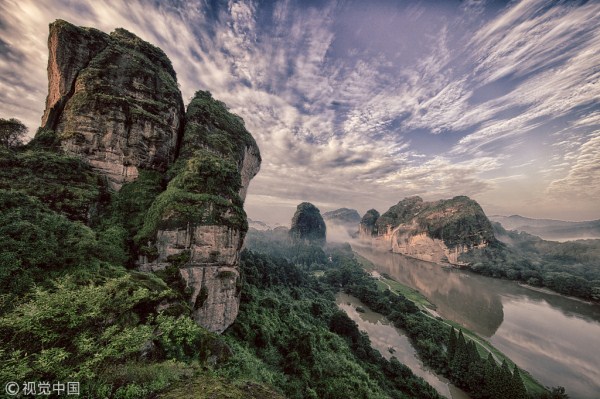
An Essential Guide to Visiting Longhu Mountain
In This Guide
- An Essential Guide to Visiting Longhu Mountain
- The Rich History and Legends of Longhu Mountain
- Main Highlights: What You Absolutely Can’t Miss
- Planning Your Visit: A Practical Guide
- Tickets: Prices, Booking, and Tips
- How to Get There: A Complete Transportation Guide
- Local Cuisine and Accommodation Nearby
- Frequently Asked Questions
- Final Thoughts on Your Trip
Nestled in the heart of Jiangxi Province, Longhu Mountain (龙虎山), or Dragon and Tiger Mountain, is a breathtaking fusion of natural beauty and profound cultural significance. As a UNESCO World Heritage site, this majestic mountain range is recognized not only for its stunning landscapes but also as a cradle of Taoism, a philosophy that has shaped Chinese spirituality for centuries.
Visiting Longhu Mountain is more than just a trip to a scenic destination; it’s a journey through time and tradition. Here, the air is infused with the whispers of ancient monks, and the tranquil surroundings provide the perfect backdrop for reflection and exploration. With a rich tapestry of history, including the remnants of ten Taoist palaces, 81 temples, and numerous monasteries, this sacred site invites travelers to immerse themselves in the teachings of Taoism amidst its dramatic cliffs and lush greenery.
Whether you seek spiritual enlightenment, outdoor adventure, or a glimpse into traditional Chinese culture, Longhu Mountain promises an unforgettable experience. From the awe-inspiring cliff tombs, where ancestral coffins are placed as a testament to the region’s unique burial customs, to the serene bamboo raft rides along the Luxi River, each moment spent here is imbued with a sense of wonder.
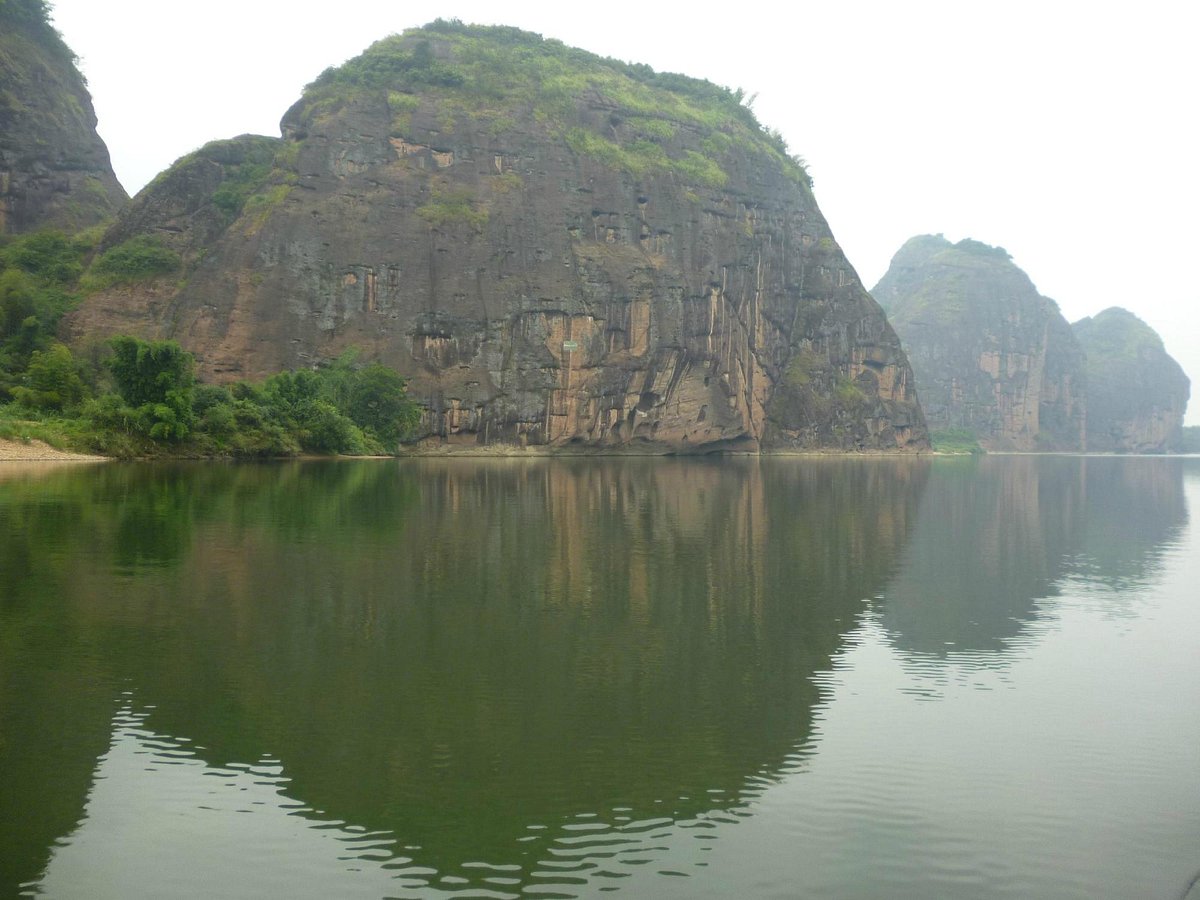
Longhu Mountain.
Prepare to be captivated as you explore this natural sanctuary, where every step reveals a new facet of its historical and spiritual significance. In this guide, we’ll navigate the essential experiences that make Longhu Mountain a must-visit destination for anyone intrigued by the rich heritage of China.
The Rich History and Legends of Longhu Mountain
Nestled in Jiangxi province, Longhu Mountain, or Dragon and Tiger Mountain, stands as a testament to the enduring legacy of Taoism and the rich tapestry of Chinese culture. This majestic mountain range, recognized as a UNESCO World Heritage site, is not only a stunning natural landscape but also a cradle of spirituality, history, and legend.
A Historical Perspective
Longhu Mountain has been a significant center for Taoism since the East Han Dynasty (25-220 AD). It is said to be the birthplace of the Zhengyi School of Taoism, founded by Zhang Daoling, a legendary figure who is celebrated for his teachings on Taoist philosophy and alchemy. Under his guidance, the mountain flourished as a sanctuary for Taoist scholars, leading to the establishment of ten palaces, 81 temples, 50 monasteries, and 10 academies. This remarkable proliferation of religious structures reflects the area’s historical importance as a spiritual hub.
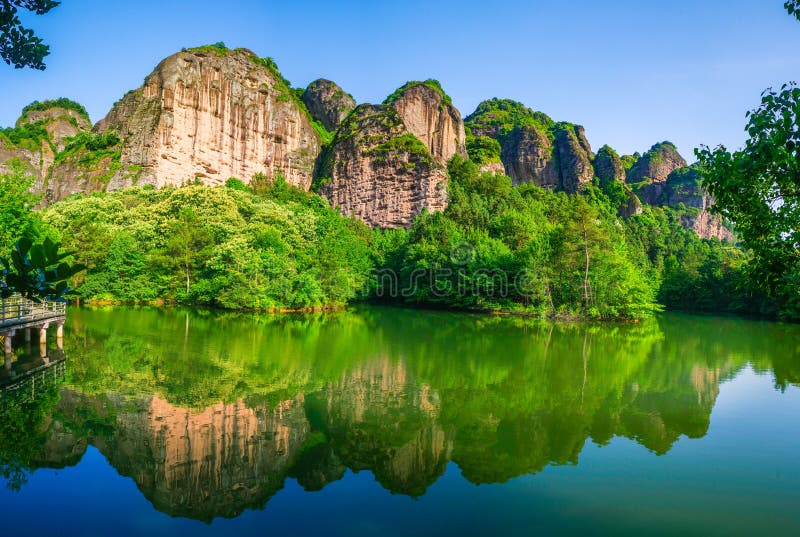
Longhu Mountain.
During the Ming Dynasty (1368-1644), the site gained further prominence. The locals, known as the Guyue people, practiced unique burial customs, interring their coffins in the cliffs, which they believed would bring their ancestors closer to heaven. The awe-inspiring cliff tombs, carved into the mountains, are not only a remarkable feat of ancient engineering but also a poignant reminder of the deep-rooted spiritual beliefs associated with the mountain.
Legends and Myths
Longhu Mountain is steeped in fascinating legends that intertwine with its historical narrative. One of the most famous tales involves the Dragon and Tiger, symbolizing the duality inherent in Taoist philosophy. According to legend, the Dragon and Tiger represent the balance of yin and yang, and their harmonious coexistence is said to bless the land with prosperity and peace.
Another captivating story is that of Zhang Daoling’s ascension to immortality. It is believed that he achieved spiritual enlightenment at Longhu Mountain, where he concocted elixirs of life. Pilgrims and seekers of wisdom continue to visit the mountain in hopes of experiencing a fraction of the enlightenment he purportedly attained.

Longhu Mountain.
Spiritual Practices and Cultural Significance
Today, Longhu Mountain remains a vibrant center for Taoist practices. Visitors can immerse themselves in the teachings of Tai Chi and Feng Shui, often seen as essential components of Taoist philosophy. The area is a sanctuary for those seeking tranquility and spiritual renewal, offering a unique blend of meditation, nature, and cultural exploration.
The breathtaking scenery is complemented by numerous activities that highlight the region’s cultural heritage. Tourists can take boat rides along the Luxi River, explore scenic hiking trails, and witness traditional performances that bring to life the legends of the mountain, such as the Hanging Coffin performance, which re-enacts ancient burial traditions.
Conclusion
Longhu Mountain is more than just a picturesque destination; it is a profound experience that invites visitors to delve deep into the heart of Taoist spirituality and Chinese culture. Its rich history, coupled with enchanting legends and breathtaking landscapes, makes it a must-visit for any traveler interested in exploring the depths of China’s cultural heritage. Whether you are a spiritual seeker, a history enthusiast, or a lover of nature, Longhu Mountain promises an unforgettable journey through time and belief.
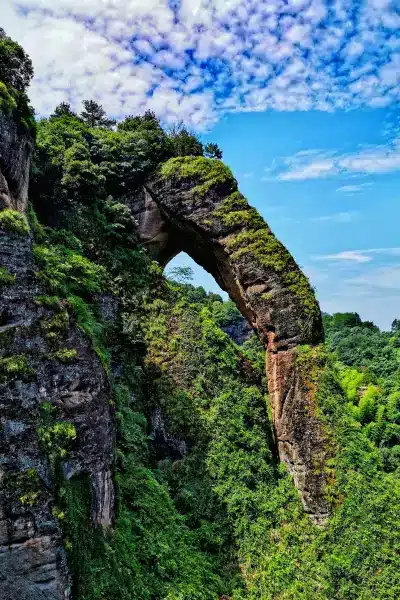
Longhu Mountain.
Main Highlights: What You Absolutely Can’t Miss
Discover the Wonders of Longhu Mountain
Longhu Mountain, or Longhushan, is not just a stunning natural wonder; it is a profound journey into the heart of Taoism and Chinese culture. Nestled in Jiangxi Province, this UNESCO World Heritage site offers a unique blend of breathtaking landscapes, rich history, and spiritual heritage. Here are the highlights you absolutely cannot miss during your visit.
1. The Sacred Taoist Sites
Longhu Mountain is renowned as the birthplace of Taoism, and its historical significance is palpable throughout the region. As you explore, be sure to visit:
- Shangqing Palace: This ancient Taoist temple, dating back to the Eastern Han Dynasty, is where the legendary Taoist Master Zhang Tianshi is said to have created elixirs of immortality. The architecture and serene atmosphere make it a must-see for those interested in Taoist practices.
- Ten Taoist Palaces: Once the heart of Taoist learning, these palaces are replete with historical artifacts and offer insight into Taoist rituals and philosophies.
- 81 Temples and 50 Monasteries: Each temple and monastery provides a unique glimpse into the spiritual life of the area, showcasing intricate designs, peaceful gardens, and the opportunity for quiet reflection.
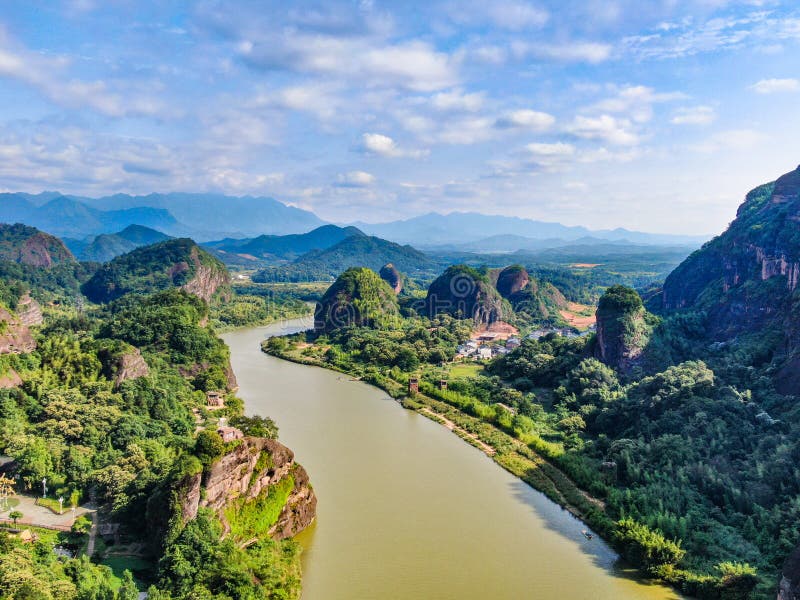
Longhu Mountain.
2. The Cliff Tombs
One of the most intriguing features of Longhu Mountain is its cliff tombs, which date back to the Ming Dynasty. These remarkable structures were built into the mountainsides, reflecting ancient burial practices that believed the deceased would be closer to the heavens.
- Hanging Coffins: Venture to the cliffs to observe the ancient coffins placed in natural cavities, a practice that highlights the unique beliefs of the Guyue people. Guided tours often explain the fascinating methods used to place these coffins high in the cliffs, adding a layer of intrigue to your visit.
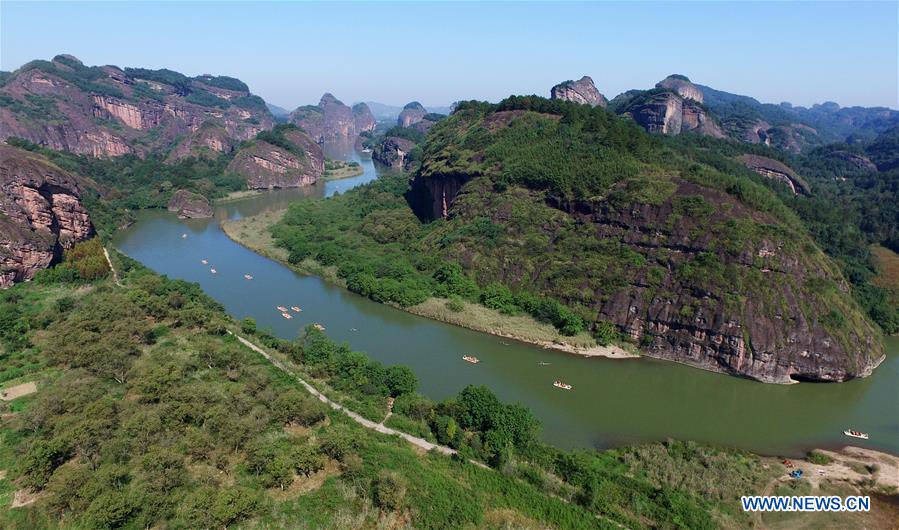
Longhu Mountain.
3. Scenic Beauty and Outdoor Activities
Longhu Mountain is not just about history; it is also a paradise for nature lovers:
- Luxi River Rafting: Experience the stunning scenery from the water with a bamboo raft ride along the Luxi River. The trip offers breathtaking views of the surrounding cliffs and lush vegetation, making it a perfect way to relax and soak in the landscape.
- Hiking Trails: With over 220 square kilometers of scenic area, the hiking trails provide various levels of difficulty. Enjoy the picturesque vistas, unique rock formations, and the tranquil sounds of nature as you traverse the paths.
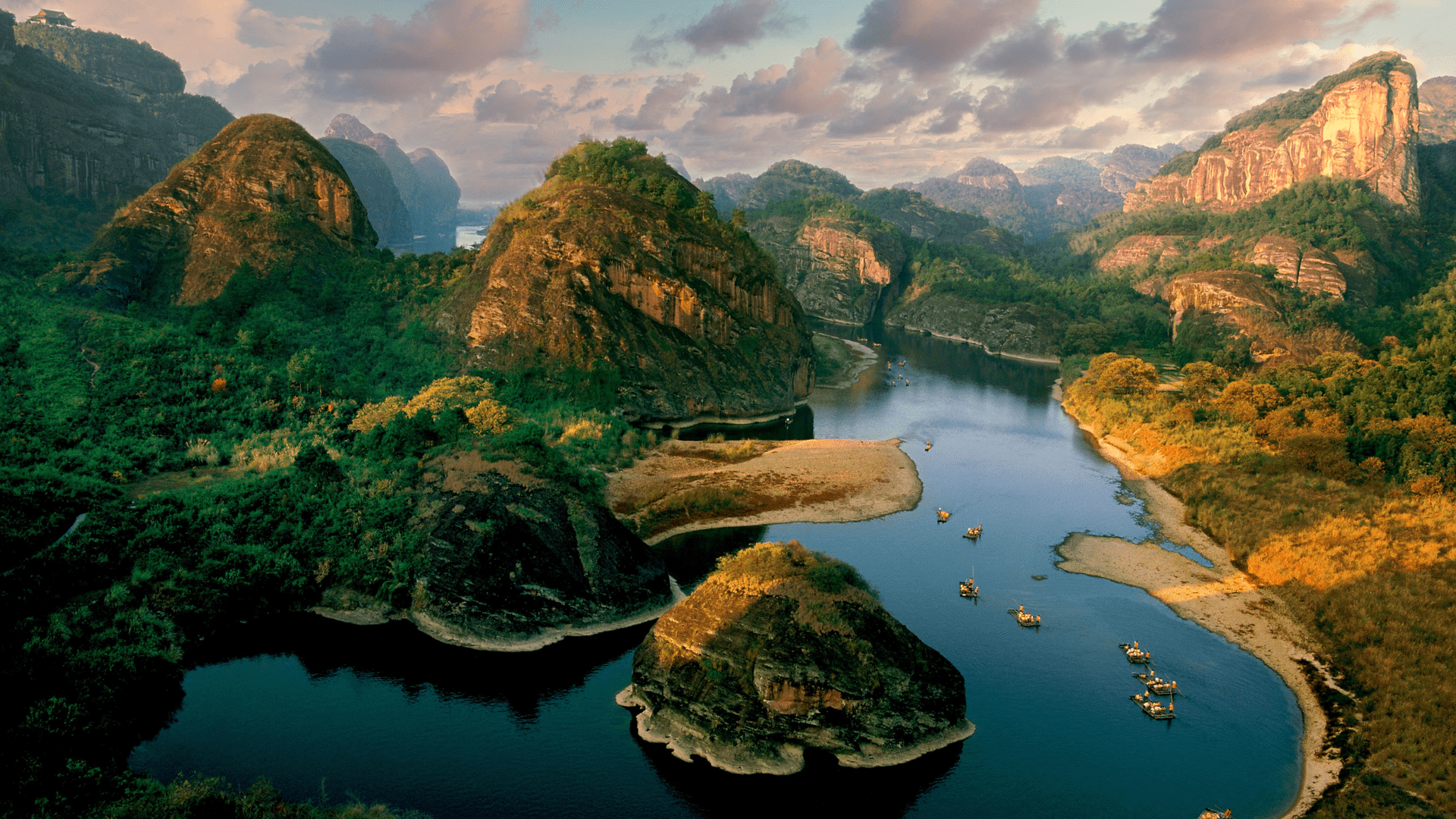
Longhu Mountain.
4. Cultural Performances
Enhance your visit with cultural performances that showcase local traditions:
- Hanging Coffin Performance: Experience a reenactment of the ancient practices related to the cliff tombs, providing insight into the region’s historical significance.
- Local Folklore Shows: Various performances throughout the area celebrate Jiangxi’s rich cultural heritage, often featuring traditional music and dance.
5. Spiritual and Wellness Retreats
For those seeking a deeper connection with Taoism, consider participating in:
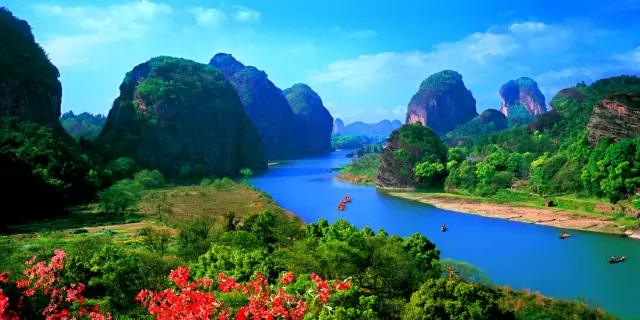
Longhu Mountain.
- Tai Chi Classes: Engage in Tai Chi sessions offered in the serene surroundings of Longhu Mountain. This practice not only enhances physical well-being but also connects you with the spiritual essence of the landscape.
- Feng Shui Workshops: Learn about the principles of Feng Shui and how they relate to the natural world, allowing you to return home with a deeper understanding of this ancient philosophy.
Conclusion
Longhu Mountain is a treasure trove of cultural, historical, and natural wonders that cater to all types of travelers. From the sacred Taoist sites and cliff tombs to the breathtaking landscapes and engaging performances, your journey through this enchanting region will leave you with lasting memories and a profound appreciation for Chinese history and spirituality. Make sure Longhu Mountain is on your itinerary for an unforgettable experience in Jiangxi!
Planning Your Visit: A Practical Guide
Essential Insights for Your Longhu Mountain Experience
Longhu Mountain, or Mount Longhu (龙虎山), located in Jiangxi Province, is a treasure trove of history, culture, and natural beauty. Whether you are a history enthusiast, a spiritual seeker, or simply in search of stunning landscapes, this UNESCO World Heritage site offers a unique glimpse into Taoism and the rich cultural tapestry of China. Here’s your comprehensive guide to planning an unforgettable visit.
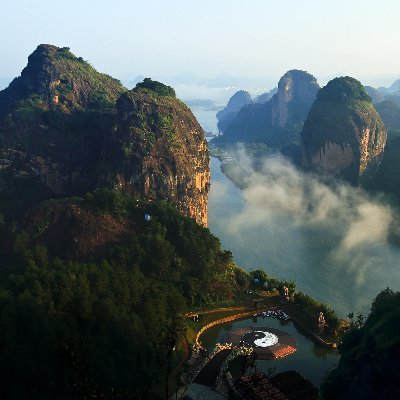
Longhu Mountain.
Getting There
-
By Train: The nearest major city is Yingtan, well-connected by high-speed trains from major cities like Shanghai, Nanchang, and Hangzhou. The journey from Shanghai takes about 4.5 hours.
-
Local Transport: Upon arriving in Yingtan, you can take bus K2 from the train station to the entrance of Longhu Mountain for a nominal fee (around 3 yuan). Alternatively, taxis and rideshare options are readily available.
Ticket Information
-
Admission Fees: A combination ticket usually costs around 260 yuan and grants access to multiple attractions within the scenic area. Be sure to bring your ID, as it may be required for ticket purchases.
-
Multi-Day Pass: If you wish to explore at a leisurely pace, inquire about a multi-day pass, which allows you to return the next day.

Longhu Mountain.
Best Time to Visit
-
Seasons: Spring (April to June) and autumn (September to November) are ideal for visiting Longhu Mountain, offering mild weather and vibrant foliage. Summer can be hot and humid, while winter may bring chilly temperatures.
-
Festivals: Consider timing your visit around local festivals, such as the Taoist celebrations, which can provide unique cultural experiences.
What to See
-
Taoist Heritage: Explore the remnants of the ten Taoist palaces, 81 temples, and 50 monasteries that were once thriving in this sacred area. Don’t miss the historical Shangqing Palace, where the Taoist master Zhang Tianshi practiced alchemy.
-
Natural Wonders: The dramatic landscapes feature steep cliffs, hanging coffins, and the serene Luxi River, where bamboo raft rides are a popular activity. The cliff tombs, dating back to the Ming dynasty, provide a glimpse into ancient burial practices and beliefs.
-
Cultural Performances: Look out for local performances showcasing traditional arts, including the fascinating Hanging Coffin demonstration.
Activities
-
Hiking and Walking Trails: For the adventurous spirit, numerous trails wind through the scenic area, offering breathtaking views. Be sure to wear comfortable shoes, as some paths can be steep.
-
Rafting on Luxi River: A bamboo raft ride down the river is both relaxing and scenic, making it a perfect way to soak in the beauty of the surrounding cliffs.
-
Kung Fu and Tai Chi Programs: Engage in traditional martial arts classes to deepen your understanding of the local culture. Look for workshops that cater to all skill levels.
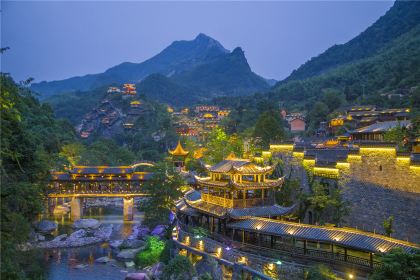
Longhu Mountain.
Practical Tips
-
Language: While you can find some English speakers, learning a few basic Mandarin phrases can enhance your experience and help you connect with locals.
-
Cash: Carry cash as many smaller vendors and attractions may not accept credit cards.
-
Accommodation: Consider staying in Yingtan for a range of options from budget inns to mid-range hotels. Staying close to the entrance of Longhu Mountain can save you travel time.
Local Cuisine
-
Dining Options: Enjoy local Jiangxi cuisine, known for its bold flavors and use of fresh ingredients. Popular dishes include rice noodles and various spicy stir-fries. Don’t miss out on dining at local eateries to experience authentic flavors.
-
Snacks: Be sure to sample local snacks sold at stalls around the scenic area, such as fried dough sticks and specialty teas.
Conclusion
Longhu Mountain is more than just a beautiful landscape; it’s a window into the heart of Taoist philosophy and Chinese culture. With careful planning and a spirit of adventure, your visit to this sacred mountain will surely be a memorable experience. Enjoy the serenity, immerse yourself in history, and take in the natural beauty that this remarkable destination has to offer.
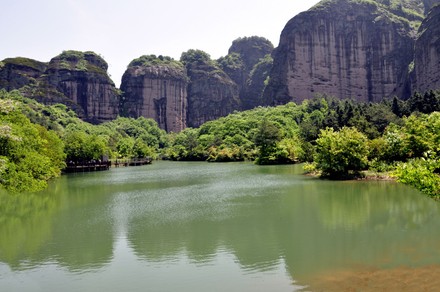
Longhu Mountain.
Tickets: Prices, Booking, and Tips
When planning your visit to Longhu Mountain, it’s essential to know the ticketing options, prices, and some practical tips to make your experience both enjoyable and seamless. This sacred site, steeped in Taoist history and surrounded by stunning natural beauty, deserves thoughtful preparation.
Ticket Options and Prices
Longhu Mountain offers several ticket types, allowing visitors to tailor their experience based on their interests and time constraints. Here’s a breakdown of the options:
-
Standard Admission Ticket: Approximately 260 CNY (about $40 USD). This ticket grants you access to the main scenic areas, including the famous Taoist temples and breathtaking landscapes.
-
Combo Ticket: For around 300 CNY (about $45 USD), this ticket typically includes additional activities such as a bamboo raft ride on the Luxi River, which provides a unique perspective of the area’s geological wonders.
-
Discounts: Reduced prices may be available for students, seniors, and children. It’s advisable to carry identification to claim these discounts.
-
Two-Day Pass: For those who wish to savor the beauty and spirituality of Longhu Mountain at a leisurely pace, consider purchasing a two-day pass for 400 CNY (about $60 USD). This allows for a more immersive experience without the rush.
Booking Tips
-
Purchase in Advance: While tickets can be bought on-site, it’s wise to purchase them in advance, especially during peak travel seasons (spring and autumn) when visitor numbers can swell.
-
Online Booking: Many travel platforms and the official Longhu Mountain website offer online booking options. This can save time and sometimes offers exclusive deals.
-
Group Tours: If you’re traveling in a group, look for package deals that might include transportation, meals, and guided tours. These can often provide a richer understanding of the historical and cultural significance of the sites.
Getting There
Longhu Mountain is accessible via public transport from nearby cities like Yingtan. The K2 bus from Yingtan’s train station is a cost-effective way to reach the entrance (around 3 CNY or $0.50 USD). Additionally, many visitors opt for local taxi services or rideshare apps for convenience.
Practical Tips for Visitors
-
Plan Your Itinerary: With 220 square kilometers to explore, it’s beneficial to prioritize key sites. Must-sees include the Shangqing Palace and the famous Cliff Tombs, which tell tales of ancestral worship and ancient burial practices.
-
Dress Comfortably: Wear sturdy shoes; the terrain can vary from smooth paths to rugged trails. Given the area’s elevation, layers are recommended as temperatures can fluctuate.
-
Stay Hydrated: Bring water, especially during the warmer months. There are some vendors within the park, but having your own supply is always a smart choice.
-
Respect Local Customs: As a site of significant spiritual importance, be mindful of local customs and practices. Respect the tranquility of the temples and the beliefs of those who visit.
Exploring Longhu Mountain is not just a journey through stunning landscapes; it’s an immersion into the rich tapestry of Taoist culture and history. By preparing in advance and understanding the ticketing options, you can ensure a rewarding visit to this remarkable destination.
How to Get There: A Complete Transportation Guide
Getting to Longhu Mountain: A Comprehensive Transportation Guide
Longhu Mountain, or Longhu Shan, is located in Jiangxi Province, a site renowned for its breathtaking landscapes and deep-rooted Taoist heritage. Whether you are a history enthusiast, a nature lover, or someone seeking spiritual tranquility, reaching this sacred destination is an adventure in itself. Here’s how to navigate your way to this majestic mountain.
By Air: The Nearest Airports
- Yingtan Mingyue Airport (YTN)
- Distance: Approximately 20 km from Longhu Mountain.
-
Overview: This small airport offers domestic flights primarily connecting to major cities such as Shanghai and Beijing. Upon arrival, you can take a taxi or a local shuttle to reach the mountain.
-
Nanchang Changbei International Airport (KHN)
- Distance: About 200 km from Longhu Mountain.
- Overview: A larger airport with more international connections. From here, you can take a train to Yingtan or hire a private car for a scenic drive to Longhu Mountain.
By Train: A Scenic Journey
Jiangxi Province is well-connected by China’s extensive high-speed rail network, making train travel a convenient option.
- To Yingtan Railway Station
- Overview: Yingtan is the closest major train station to Longhu Mountain. High-speed trains operate frequently from major cities like Shanghai, Nanchang, and Guangzhou.
-
From the Station: Upon arrival at Yingtan Railway Station, you can take a local bus, taxi, or the K2 bus service directly to the mountain’s entrance for a nominal fee (around 3 yuan).
-
Considerations: Booking your train tickets in advance is advisable, especially during peak travel seasons or holidays.
By Bus: Local Connections
Long-distance Buses
– From Nearby Cities: Regular bus services operate from cities such as Nanchang and Jiujiang to Yingtan. Buses typically depart from central bus stations, and the journey may take anywhere from 2 to 4 hours depending on your starting point.
Local Transport
– Within Yingtan: Once in Yingtan, local buses and taxis are available to transport you to the Longhu Mountain Scenic Area. The buses are often economical and provide a chance to mingle with locals.
By Car: Self-Drive Adventures
For those who prefer the flexibility of driving, renting a car can be a great option. The scenic roads leading to Longhu Mountain allow you to enjoy the picturesque landscapes of Jiangxi Province.
- Driving Directions: Major highways connect Yingtan to other regional cities. Follow signs for Longhu Mountain once you are close, and consider using GPS for ease of navigation.
Inside the Scenic Area: Getting Around
Once you arrive at Longhu Mountain, the sprawling scenic area features various attractions spread over 220 square kilometers. Here are your options for getting around:
- Trams and Buggies
-
Overview: A convenient tram or buggy service operates within the park, allowing you to hop on and off at various scenic spots without tiring yourself out.
-
Rafting on the Luxi River
-
Experience: For a unique perspective, consider taking a bamboo raft ride down the Luxi River. This leisurely journey allows you to soak in the natural beauty of the cliffs and the unique hanging coffins that adorn the mountain sides.
-
Walking Trails
- Hiking: If you are up for adventure, the park has numerous walking trails that lead to breathtaking viewpoints and hidden temples, offering a deeper connection to the mountain’s spiritual essence.
Final Tips
- Travel Insurance: Consider obtaining travel insurance before your journey, as it can provide peace of mind during your travels.
- Language: While some signage may be available in English, having a translation app or a local guide can enhance your experience, especially in more remote areas.
- Weather Considerations: Check the weather before your trip; the best times to visit Longhu Mountain are during spring and autumn when the weather is mild and colorful foliage enhances the beauty of the landscape.
Longhu Mountain is not just a destination; it’s a journey through history, spirituality, and nature. With this transportation guide, you are well-equipped to embark on your adventure to this sacred site. Safe travels!
Local Cuisine and Accommodation Nearby
Exploring the Longhu Mountain region offers not only breathtaking scenery and a dive into Taoist heritage but also a delightful culinary experience and comfortable accommodations that capture the essence of Jiangxi’s culture.
Savor the Local Cuisine
When it comes to local delicacies, Jiangxi cuisine is known for its bold flavors and creative use of fresh ingredients. Here are some must-try dishes while you are in the Longhu Mountain area:
- Jiangxi Rice Noodles (江西米粉): A staple in the region, these thin rice noodles are often served in a flavorful broth with a variety of toppings such as braised meats, vegetables, and pickled condiments.
- Stir-Fried River Shrimp (炒小龙虾): Freshwater shrimp, typically caught from the nearby rivers, are stir-fried with spices and garlic, making for a deliciously fragrant dish.
- Steamed Fish with Pickled Mustard Greens (蒸鱼配黄鳝): This dish highlights the local fish, steamed to perfection and served with tangy pickled mustard greens, offering a refreshing contrast of flavors.
- Taoist Herbal Tea (道教药茶): A blend of medicinal herbs traditionally consumed for health benefits, this tea is a wonderful way to rejuvenate after a day of exploration.
For an authentic dining experience, consider visiting Longhu Mountain Tea House, where local delicacies are served in a serene setting overlooking the mountains. Alternatively, Yingtan Old Town Street boasts a variety of eateries where you can sample local snacks and dishes.
Comfortable Accommodations
After a day of hiking and cultural immersion, you’ll want a cozy place to rest. Here are a few recommended accommodations that offer a combination of comfort, convenience, and local charm:
-
Yingtan Pinpinmei Inn: A popular choice among travelers, this inn is conveniently located near the entrance to Longhu Mountain. Rooms are comfortable and well-equipped, and the staff is friendly and helpful. Prices are budget-friendly, making it a great option for solo travelers and groups alike.
-
Longhu Mountain Resort Hotel: Offering more luxurious accommodations, this hotel features spacious rooms with stunning views of the mountains. The on-site restaurant serves a variety of local and international dishes, perfect for unwinding after a day of exploration.
-
Longhu Mountain Scenic Area Guesthouse: For those seeking a more local experience, this guesthouse provides a homey atmosphere with traditional decor. Guests can enjoy homemade meals and the warmth of local hospitality.
-
Fangte Hotel: Located in Yingtan, this hotel provides modern amenities and quick access to the scenic area. The hotel features clean, comfortable rooms and a lovely garden, ideal for relaxation.
Conclusion
The Longhu Mountain area is not just a feast for the eyes but also a culinary paradise and a haven for relaxation. Whether you are savoring local dishes or enjoying a restful night after your adventures, the warmth of Jiangxi’s culture will make your visit truly memorable.
Frequently Asked Questions
Frequently Asked Questions about Longhu Mountain
1. What is Longhu Mountain known for?
Longhu Mountain, or Mount Longhu, is renowned for its significant role in Taoism and its stunning natural landscapes. It is home to numerous Taoist temples, monasteries, and palaces, making it a sacred site for spiritual seekers. Additionally, the area features unique geological formations, including cliff tombs and beautiful river scenery.
2. How do I get to Longhu Mountain?
Longhu Mountain is located in Jiangxi Province, China. The nearest city is Yingtan, which is accessible via high-speed trains from major cities like Shanghai and Nanchang. Once in Yingtan, you can take local buses or taxis to reach the entrance of the scenic area.
3. What is the best time to visit Longhu Mountain?
The ideal times to visit Longhu Mountain are during the spring (April to June) and autumn (September to November) when the weather is mild and the scenery is particularly beautiful. The lush greenery and vibrant foliage enhance the area’s natural beauty during these seasons.
4. Are there any guided tours available?
Yes, there are various guided tours available that include visits to key attractions within Longhu Mountain. These tours often cover highlights such as the Taoist temples, the hanging coffin performances, and scenic boat rides on the Luxi River, providing an enriching experience of the local culture and history.
5. What should I wear when visiting Longhu Mountain?
Dress comfortably and wear sturdy walking shoes, as you will likely be doing a fair amount of walking and hiking. Given the mountainous terrain, it’s also wise to check the weather forecast and bring appropriate clothing, such as a light jacket for cooler evenings or rainy days.
6. Is there an entry fee to access Longhu Mountain?
Yes, there is an entry fee to access the scenic area. Ticket prices may vary based on the season and the type of experiences included (such as boat rides). It is recommended to check for any combo tickets that allow for multiple attractions at a discounted price.
7. Can I explore Longhu Mountain on my own?
While it is possible to explore Longhu Mountain independently, many visitors find that guided tours enhance their experience by providing insights into the rich history and cultural significance of the area. If you prefer to explore alone, ensure you have a good map and plan your route ahead of time.
8. What cultural experiences can I expect at Longhu Mountain?
Longhu Mountain offers a variety of cultural experiences, including traditional performances, opportunities to learn about Taoism, and the chance to witness local customs and practices. Visitors often enjoy activities such as Tai Chi classes and watching the historical reenactments of the hanging coffins, which showcase the region’s unique burial traditions.
Final Thoughts on Your Trip
As you conclude your journey through the enchanting Longhu Mountain, take a moment to reflect on the myriad experiences that await you in this sacred realm of Taoism and breathtaking natural beauty. Here are some final thoughts to inspire your departure:
A Tapestry of History and Nature
Longhu Mountain is more than just a stunning landscape; it is a living testament to the rich tapestry of Chinese culture and spirituality. From the ancient Taoist palaces and temples to the mystical cliff tombs of the Guyue people, every corner of this mountain tells a story steeped in tradition and belief.
Embrace the Serenity
In a world that often feels rushed and chaotic, the tranquility found here is a precious gift. Whether you found peace in the gentle flow of the Luxi River or in the quiet contemplation of the majestic cliffs, remember to carry that sense of serenity with you as you return to your daily life.
Connect with the Culture
You’ve not only witnessed the stunning vistas but also engaged with the deeply rooted customs of the local people. From the captivating performances to the stories of the boatmen, every interaction has offered a glimpse into the heart of Jiangxi’s culture. Embrace these memories and share them with others to keep the spirit of Longhu alive.
A Call to Return
As you leave Longhu Mountain, it’s essential to recognize that this destination holds endless opportunities for exploration. The pathways that wind through the mountains beckon you to return, promising new adventures and deeper insights into the profound philosophies of Taoism and the breathtaking landscapes that accompany them.
In closing, Longhu Mountain is not merely a place on the map; it is an experience that nourishes the soul and ignites a passion for discovery. Carry the essence of this sacred mountain with you and let it inspire future travels. Safe journeys!